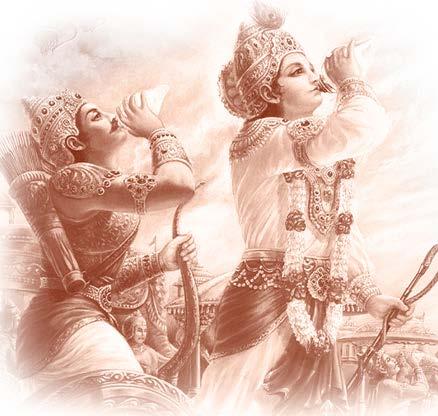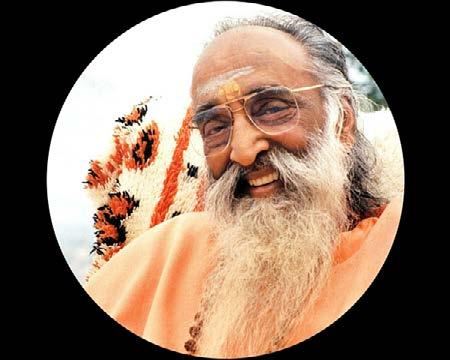
10 minute read
5. Gita Reflections
Gita Reflections

Advertisement
loksZifu"knks xkoks nksX/kk xksikyuUnu%A ikFkksZ oRl lq/khHkksZDrk nqX/ka xhrke`ra egr~AA
(Gita Dhyanasloka)

Vishaad Yoga
Swamini Samatananda
All the Upanishads are cows; the Milker is Krishna, the cowherd boy; Arjuna is the calf; Wise and pure men drink the milk, the supreme, immortal nectar of the Gita

Gita Reflections
‘Vishaada’ or ‘Shoka’ or ‘Grief’ is something that any person dreads. But it is interesting to see that how grief can become one of the greatest blessing and can bring about a turning point in one’s life. This can be learnt from the example of Arjuna who had gotten grief stricken just before the epic war of Mahabharata.
The mental state of Arjuna is not just an individual mental state but the coflict that Arjuna faced just before the war on the battlefield of Kurukshetra is a conflict that every human being faces at some time of life or the other. This conflict is the conflict between what is my Dharma and what is not my Dharma. This indecisive state of being unable to decide what is right for me to do in a particular situation and what is not right for me to do is not an experience which a person can surpass very easily. This inner dillema if not handled correctly and at the right time can result in the worst ever state of mind and that is grief. A grief stricken person who is not able to decide what is his dharma can face hell here and now. He doesn’t need to go any other place of hell. The nature of grief, its causes and its consequences are all seen in Arjuna as seen in the first chapter of Srimadbhagawad Geeta, which is a story of all mankind. The problem of Arjuna is a problem of all human beings. But what is the cause of such universal human grief, such a mental conflict? This can be understood as one understands the mental state of Arjuna.
Arjuna’s state of mind, his conflict between his emotions and that

Gita Reflections
which is right, his psychological breakdown, and his justifications to give up war all form a strong blend reflecting how moha or wrong understanding is the cause of all shoka, all grief. Wise men call Arjuna’s state of mind as ‘Arjuna’s disease’ which actually is the disease of all mankind. All human suffering is only a straight fallout of one’s own ignorance and misunderstanding towards one’s own self, and towards one’s dharma. Adi Shankaracharyaji in his commentary on the Geeta analyses the entire first chapter diagnosing that moha alone is the cause of all shoka. This is the penultimate point explained in the 1st chapter of the Geeta. Yet the symptoms of grief, the psyche of wanting to escape one’s duties in a state of indecisiveness, various justifications that a human mind can give, all form different resulting branches of the Arjuna state of mind.
Wise men and Acharyas also explain the significance of the 1st chapter of the Geeta, unfolding the blessings of grief. As the name suggests the first chapter is called as ‘Arjuna Vishad Yoga’. Vishad or grief is that state of mind which is indecisive and that is why an intense choking feeling and helplessness. It is a state that can shatter the mightiest of beings, if not resolved. But there is a silver lining to this dark cloud and that is-that whenever a person is grief-stricken he is compelled to think. It is just like a person who is drowning and so he will hit his hands and feet right and left so as to survive the drowning state. So also a grief stricken person is compelled to think of a way out from this sorrowful state of indecisiveness and helplessness. This is not only the time when a person is compelled to think but this is the time when a person re-

Gita Reflections
alizes how limited his knowledge is and that there is a great need of a wise person in his life, there is great need for knowledge in his life. Thus a person in such a state realises his ignorance and becomes humble and available to seek knowledge from any such Master who has the right knowledge. So grief blesses us with humility and the desire to learn and think. When such a desire is intense then alone a person looks for a Guru and surrenders at his feet, then alone one comes to see the significant role of Ishvara in one’s life thus requesting for that knowledge which will liberate him from all grief and indecisiveness. Thus realization of ignorance leads to a ‘yoga’ an association with wisemen or God who then bless us with knowledge. In such a case ‘grief or vishad’ goes on to bring about a yoga, an association with Ishvara, with wise men and with knowledge, thus becoming a greatest turning point in one’s life. Thus grief can become a great blessing, if it gets such a positive turn. We all face such a psychological dillema , but can we make this dillema an instrument in opening new doors of learning. In bringing about a new insight towards life and all the decisions that we take. If so, then grief is indeed one of the greatest blessings.

- 35The Art Of Man Making
Few Succeed, Many Fail-Why?

P.P. Gurudev Swami Chinmayanandaji

The Art of Man Making
The simple technique in all success was already given out. “Surrender to a great ideal, and centering your heart at the ideal, act well.” The bosom gets flooded with a gushing, gurgling spring of dynamism. This should not be allowed to get dissipated either in the regrets of the past, or in the anxieties of the future, or with the excitement in the present. Bring the entire dynamism to express itself in the field of endeavour and thus fight the battle of life.
This philosophy and way of life sounds so simple and so completely satisfactory to the rational intellect in us, that we wonder why so few people live this perfect life.
In order to drive home the philosophy, Krishna even pleads Those persons who constantly practiced this teaching with full faith and without caviling, they were freed from all bondages of actions. And conversely, Krishna says, Those who decry the teaching of the technique of success understand those fools to be deluded of all knowledge, and lost.
When Krishna does again and again gaurantee the effectiveness of his philosophy of success, the intelligent sceptic may find a doubt arising in his mind. If there be Such a way to success, which seems to be quite acceptable, and even simple to practice, why is it that we find even among the children of the

The Art of Man Making
Hindu culture so few who climb and reach the peak of material or spiritual success?
Anticipating this probable question, we find Krishna answering it here with utter honesty. All living creatures follow their own tendencies (Vasanas); even a wise man acts according to the the tendencies of his own nature. What can restraint do? All Creatures during their lifetime think according to their Vasanas, and act as they powerfully think. The source of all activity in every creature is thus it’s tendencies for Vasanas. Krishna, therefore, announces here, “All living creatures follow their own tendencies; even a wise man acts according to the tendencies of his nature”. More pithily the Lord pronounces, “Beings follow nature”.
Even a wise man follows his tendencies-here, “Wise man means not a man of perfection, but an erudite scholar-One who has understood intellectually the implications of the technique of sure success.
Here then is the answer to the unexpressed doubt-why do men not generally follow such a simple “art of success” in life? Even one who has intellectually understood this technique seems to fail to live it-why? “Beings follow their own nature”

The Art of Man Making
The truth of this Paradox is experienced by everyone of us in life. A doctor can be a drunkard, although he has full knowledge of the adverse effects of alcohol, and may come to die of cirrhosis of the liver! a lawyer who knows law may, under provocation, commit even a murder. That we know is not sufficient for us to live what we know.
Intellectually we may applaud and appreciate to a certain moral value of life, but by the time it has to be expressed as action, we act as slowly as we had no education at all. Strange is the enchantment of this Paradox!
Just because I can appreciate music or painting, it does not mean I can sing tunefully or produce a Masterpiece! Knowledge is needed; but to express the knowledge we need a lot of laborious training. By merely restraining, all of a sudden nothing can happen. The question , what can restraint do? along with them admission “creatures follow their own nature” sounds as though it is a statement of despair.
But Krishna is not a cynic-He has the greatest hope for the highest possibilities in men. Yet he has to state the truth-It is the honest diagnosis of life. It explains why even the educated and the cultured behave sometimes worse than the uneducated and the uncultured.

The Art of Man Making
So then, “Even the wise act according to the nature” Let me give an example, A moros man, tired from work, returns home. He feels like picking on someone to let off the steam, but can find nothing on which he can blow up. Then his cup of coffee comes. He sits and sips it-here is his chance-he howls and roars, curses all, complaining that there is no sugar in his coffee. His loving wife calls out from the kitchen, “I have put sugar. It is in the cup” This enrages the man more. At last she again calls out “the spoon is in the saucer.” The man, still murmuring and complaining at the fate, studies his coffee and lifts the cup to his lips. Then no more complaints. In all silence he drinks his coffee and goes out. The wife smiles.
The cup of coffee has sugar: the erudite scholar had knowledge. But the coffee was not stirred properly and so it was not sweet. When book knowledge is well digested with reflection and practiced for sometime, the knowledge can come to add a fresh glow to our actions. Instruction does not constitute education; instruction is necessary and it is easily available. But education is the goal to be reached: and it is to be gained by one’s own reflection. Instruction is given; education is achieved. Instruction is objective; education is a subject phenomenon kindled in the student and maintained by the teacher.
In modern times we have instructional institutes, no education-

The Art of Man Making
al schools? Therefore, we have many instructors but hardly any teachers! It is mainly the duty of each one of us to get educated. Teachers should instruct and inspire students to digest independently-even here, real teachers can, by their example and nobility, help to maintain the inspiration kindle in the student.
What can mere self-restraint do? And restraint must spring from our own understanding that we are now indulging in, is a shameful waste of life’s vitality and chances.





